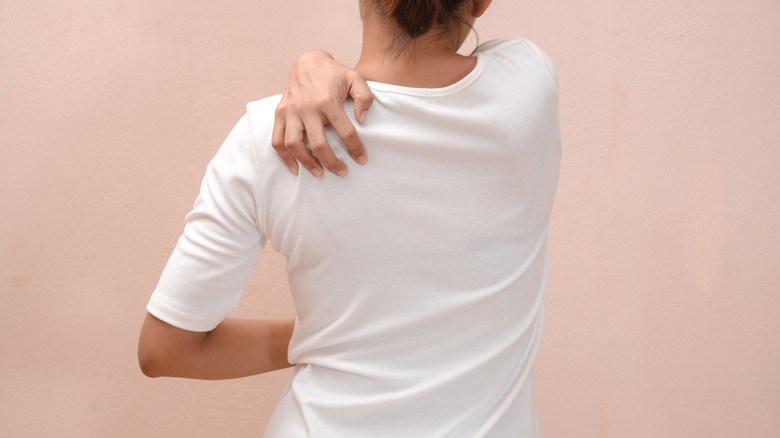What It Means When Your Shoulders Itch
Itchy skin is an unfortunate fact of life. For some, it's something to contend with once in a while, like in winter. This can be the result of dry air inside heated buildings that can dry skin out or low ambient humidity (via WebMD). Exposure to the bright winter sunlight can add to the problem by causing sunburns, regardless of the temperature outside. And those in a windy climate know how badly a strong gale can chap exposed skin. Until the skin is properly moisturized and cared for, all of this can leave the skin irritated.
Unfortunately, itchy skin is a generalized issue. In other words, it can take place just about anywhere on the body, where the skin dries out. However, as frustrating as it is, it's nothing compared to the kind of tingling that seems to camp out in one spot. It can be caused by a bug bite or skin exposure to an allergen.
Either way, there are some itches that can't be traced to certain contact points. In these cases, it could be something a little more serious. In fact, the reoccurring irritation in one spot without any outward rash may be a sign of a nerve issue, explains the American Academy of Dermatology. And if that itch is in the shoulders, it could be blamed on one specific condition.
The condition is not easy to identify
In 2012 a woman wrote to Prevention because she had a persistent shoulder itch that her initial doctor said was all in her head. There was apparently no outward rash and she couldn't stop the itching, so she wanted a second opinion. Luckily, medical professionals answered her concern with the suggestion that she may be affected by notalgia paresthetica.
Notalgia paresthetica (NP) is a condition brought on by cutaneous nerve damage (per a 2013 report published in Dermatology Practical & Conceptual). Itching usually sets in around the middle of the shoulder blade. The effects can last from months to years, and unless the affected person scratches themselves, the skin will appear unaffected.
Although the condition is common, it's not easy to distinguish because the lack of outward symptoms may lead some doctors to draw up the same response the woman initially got in 2012 before she wrote to Prevention. Unfortunately, there is a lack of research into the condition because of its perceived rarity (via a 2022 StatsPearl article). However, notalgia paresthetica is benign, and therapeutic treatments do exist. Patients only need to rule out other causes with their doctors to proceed with a possible diagnosis.


